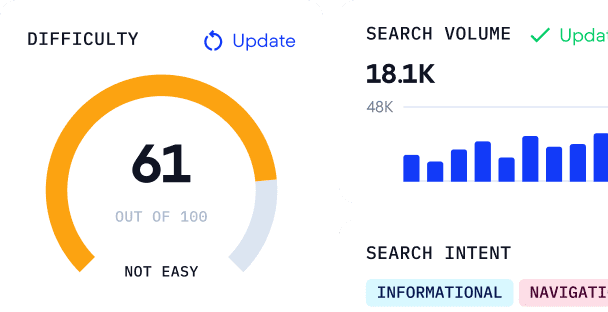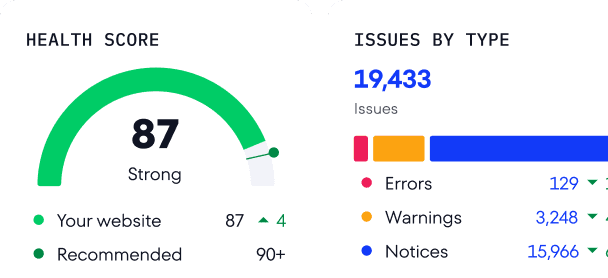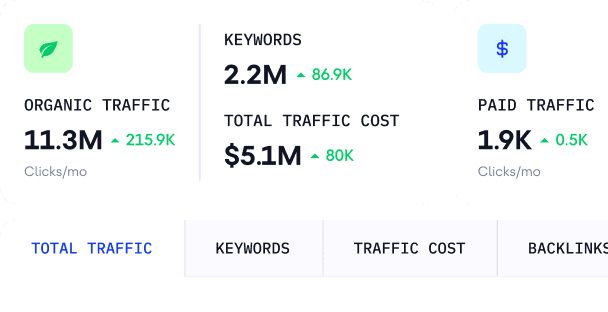Effective SEO leads generation to easily get new SEO clients
If you’re a marketing agency, especially one that specializes in SEO, you know how tough it can be to get new clients. The issue lies in the highly competitive market, where only the most effective SEO lead generation tactics can be successful. Unfortunately, many businesses fall short in this regard, struggling to discover how to create and implement these strategies.
But no worries! In this article, we will explore:
- How to find qualified SEO leads
- How to segment SEO leads
- The most profitable SEO lead generation channels
- How to communicate effectively to build long-term business relationships
Important note: We have interviewed several subject-matter experts with tons of SEO experience to add more insight and value to this post. Based on their feedback, we have compiled a comprehensive guide with SEO lead generation tips suitable for agencies of all sizes.
Sounds good? Then let’s jump in!
What are SEO Leads?
An SEO lead is an individual or a business that’s expressed interest in the SEO services your SEO agency offers. It could be that they’re looking for help fixing tech problems on their site, creating content that speaks to their target market, or they could need help with developing a full-on SEO campaign. It all depends on the size of their business, location, allocated budget, and more.
By properly qualifying your SEO leads and then building strong relationships with them, your marketing agency has a chance to pull in new customers and potentially turn collaboration with them into long-term success.
By opting for SE Ranking’s Agency Pack add-on, you get the opportunity to join a list of top-notch SEO companies in our premium catalog. Here, you can show off your expertise to the right audience and, therefore, expand your customer base.
How to Generate SEO Leads
There are a number of ways to attract high-quality leads, including SEO and paid advertising, or a combination of both. Social media can also be useful for capturing qualified prospects. Let’s explore step-by-step process on how these channels can be used alongside to generate traffic with a high potential to convert into leads.
Step 1. Use SEO to generate organic traffic
Among a variety of lead generation strategies, this one deserves the utmost priority when it comes to reaching new prospects. To achieve this, you can focus on content marketing, link building, and technical SEO.
Tip 1. Content marketing
Although content marketing is a lengthy process that requires tons of effort on your part, it is one of the most cost-effective and sustainable types of inbound SEO lead generation. To maximize the results gained from your content marketing efforts, make sure to:
- Answer the questions that your primary clients have and show them that you understand their pains.
- Create content for different sales funnel stages.
- Produce relevant content only (e.g., if an agency provides technical SEO services, there’s no need to cover topics like TikTok SEO).

To streamline the content creation process, you can use the Content Editor from SE Ranking’s Content Marketing Tool. It enables you and your team to create content that appeals to both people and search engines.
The Content Editor is a tool that enables users to quickly build SEO briefs, write optimized texts, and assess content quality. It suggests content parameters, recommended terms, and content structure based on SERP competitors. Additionally, the tool features a built-in plagiarism checker to guarantee that the content produced is original and unique. Content Editor also ensures that your content’s readability is high-quality, and analyzes grammar/punctuation mistakes.
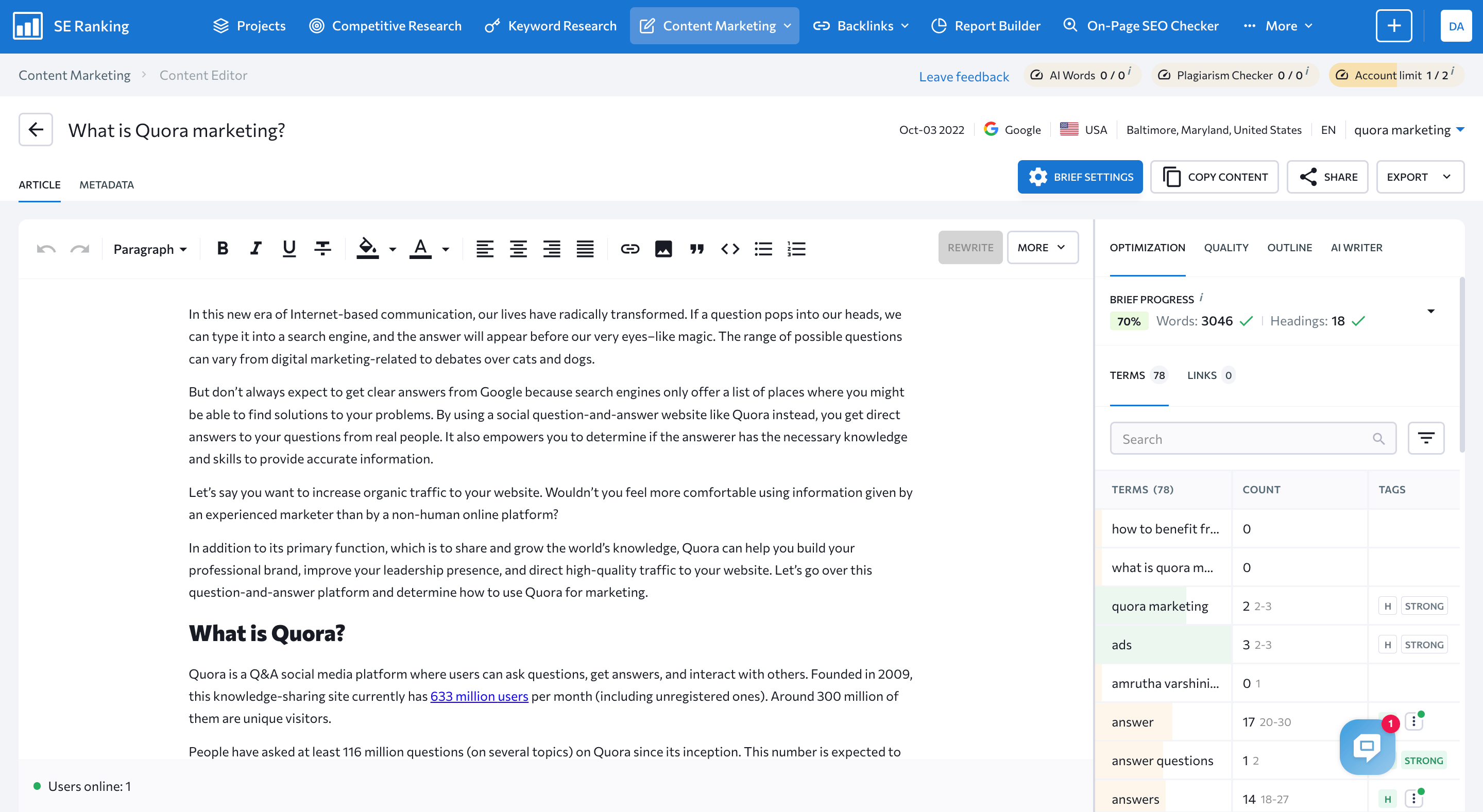
An excellent example of a successful content marketing strategy can be found in Coalition Technologies, a Los Angeles-based SEO & web design agency. By creating content aimed at profitable businesses, such as DUI attorneys and plastic surgeons, the agency has attracted a significant amount of organic visitors. Their blog posts offer practical solutions to address people’s pain points, rather than just acknowledging them. This approach has allowed Coalition Technologies to tap into an audience looking for helpful advice that caters to their specific needs.
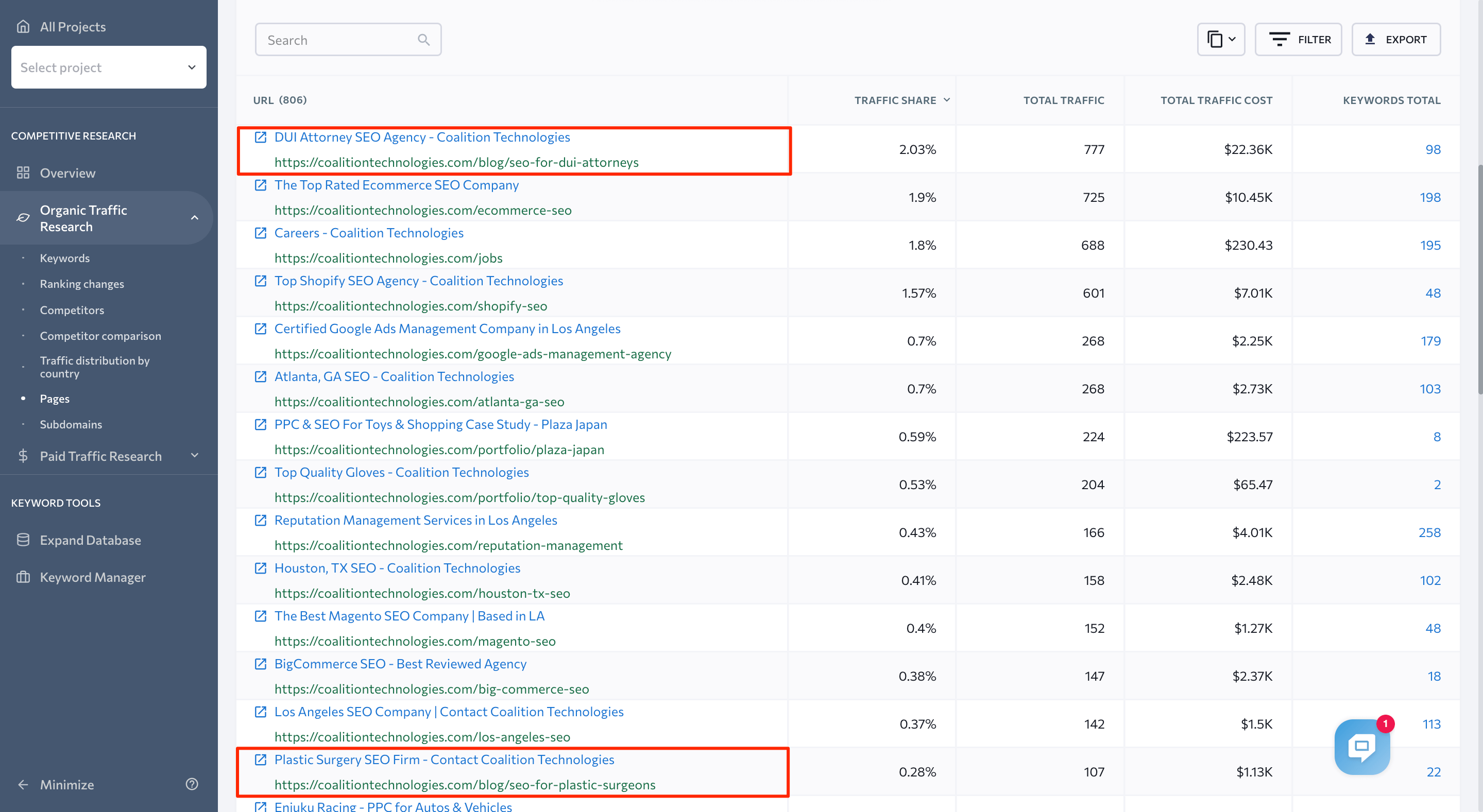
Coalition Technologies’ blog content serves as commercial landing pages. Simply put, it’s mainly focused on sales. Accordingly, by targeting its niche and creating sales-oriented content, the company was able to attract purchase-ready prospects. This is a great strategy for companies looking to generate SEO leads quickly and efficiently.
Another excellent example of an effective content marketing strategy is seen in the work of Rise at Seven. This SEO agency creates beginner and definition guides that answer common questions about SEO to acquire high-quality prospects. Their blog includes articles about digital PR, keyword mapping, TikTok SEO, and other related topics. It can be assumed that they use this type of content to draw in SEO leads with an informational search intent and then guide them through different sales stages until they ultimately make a purchase. While this approach may be beneficial in terms of increasing website traffic, its conversion rate is likely to be low.
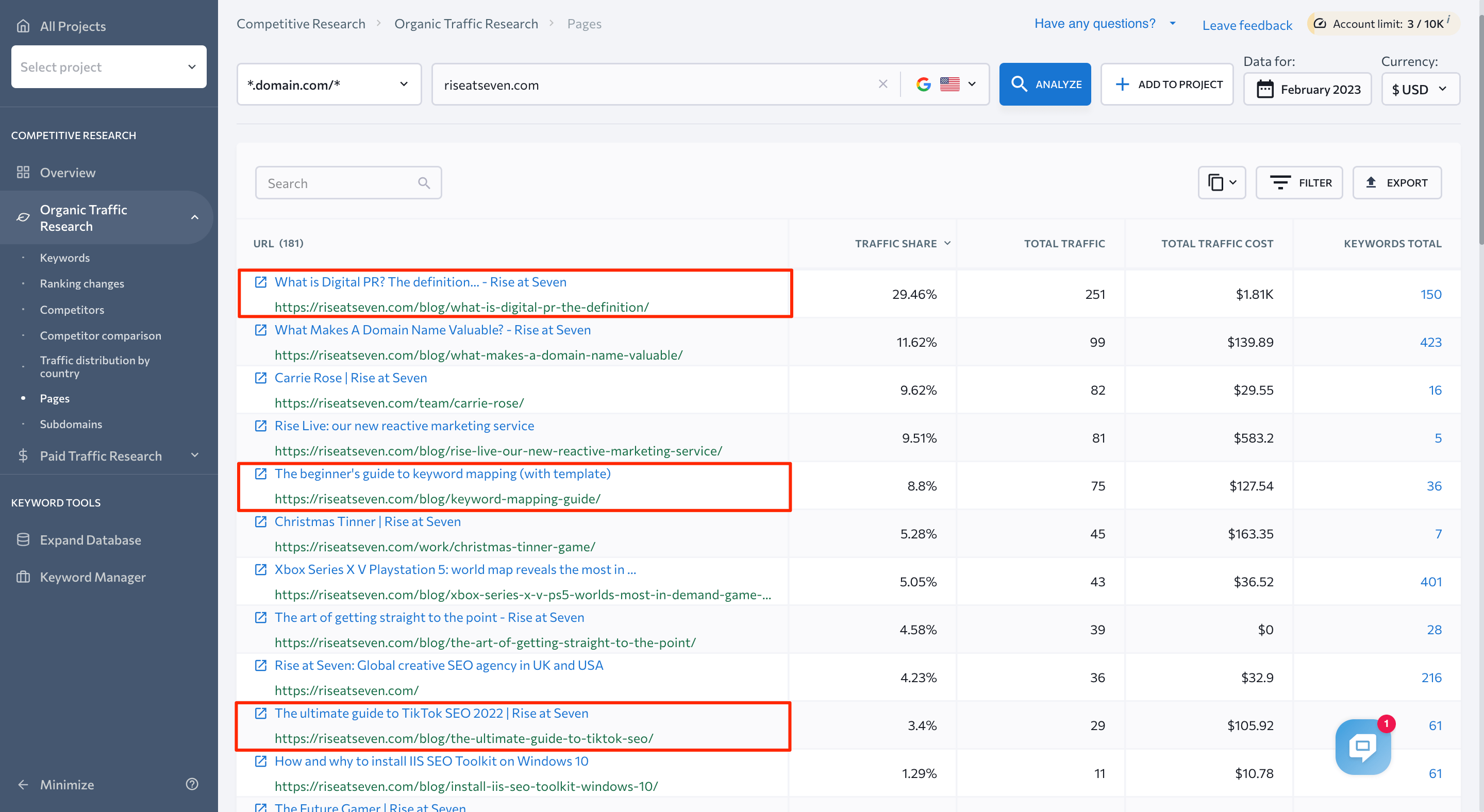
What’s more, it’s quite a common practice for marketing agencies to incorporate case studies into their content marketing strategies. While this type of content does not typically attract organic traffic, it does work well in retaining SEO leads.
In particular, case studies are a great way to show off successful projects you’ve been working on and, in turn, the SEO results your marketing agency helps to achieve. Thus, it’s a win-win situation for both you and your leads: you get a chance to demonstrate real-world examples of your projects and your prospects gain valuable information about the benefits they can expect from your services.
Tip 2. Link building
Agencies looking for quality leads via link building should consider the following SEO lead generation strategies:
- Use PR tactics to earn backlinks from reputable sources. Connect with influencers and SEO pros in your field to get coverage and links from top-notch, trusted sites. Not only will this help you build a backlink profile, but it’ll also raise awareness of your business and draw in more potential customers.
- Focus on backlinks for referral traffic. By producing engaging content that aligns with the interests of authoritative websites in your field and your target audience, you can expose your agency to a vast number of new readers who might be potentially interested in your services. For instance, if your agency targets an e-commerce business, you can publish articles on e-commerce-related websites that your prospects are likely to read. These articles might cover topics like strategies for boosting online sales, the latest developments in e-commerce, or tips on how to run an online store. By including links back to your site within the articles, you’ll be able to drive targeted traffic to your website.
Tip 3. Technical SEO
An SEO agency’s website represents the business’s overall image. If it has technical issues, such as slow website speed, poor mobile experience, or improper redirects, prospects might think that the agency is not professional enough to provide high-quality services.
To combat this, regularly crawl your website to detect technical SEO issues and fix them. This will make it easier to move visitors through the conversion funnel and encourage them to take action. Any time, money, and effort you put into making your website more user-friendly is worth the effort, and will pay your business dividends in the long run.
Step 2. Incorporate ad campaigns to generate paid traffic
There is no single “right” way to drive traffic, as it depends on a number of factors, including your target audience and the current state of your business. For example, if you’re an established SEO agency, it’s likely that you’re mainly focused on organic traffic, and you’re using paid channels specifically as an additional way to generate leads. On the other hand, if you’re a brand-new SEO agency, you’re more likely to use paid channels as the main source of driving people to your website.
Anyway, despite the size of your business, make sure to consider ad campaigns as a part of your SEO lead generation strategy.
Tip 1. Implement broad Google Ads campaigns
For instance, Search Berg, a well-established digital marketing firm with a decade of expertise in SEO and web design, is currently running a Google Ads campaign for their primary services in the United States. Here, you can see their landing page dedicated to e-commerce businesses, which emphasizes the advantages of SEO in this industry while also providing pertinent information about Search Berg’s services.
With the keyword “agency SEO,” Search Berg manages to secure the second position in paid search results. This way, this agency has established itself as a leading SEO solution currently available on the market. On top of that, by including pricing information in the ad title (“$450 SEO Marketing Services – Award Winning SEO Agency”), they set clear expectations about costs for potential customers. This, in turn, also contributes to more efficient and effective SEO lead generation.

Tip 2. Implement narrow Google Ads campaigns
At the same time, Search Berg uses narrow promo campaigns focused on GMB setup & optimization services, as well as website design & development, to attract sales-ready paid traffic. These ads focus on more targeted users who are way further in the buying cycle and more likely to convert into paying customers.
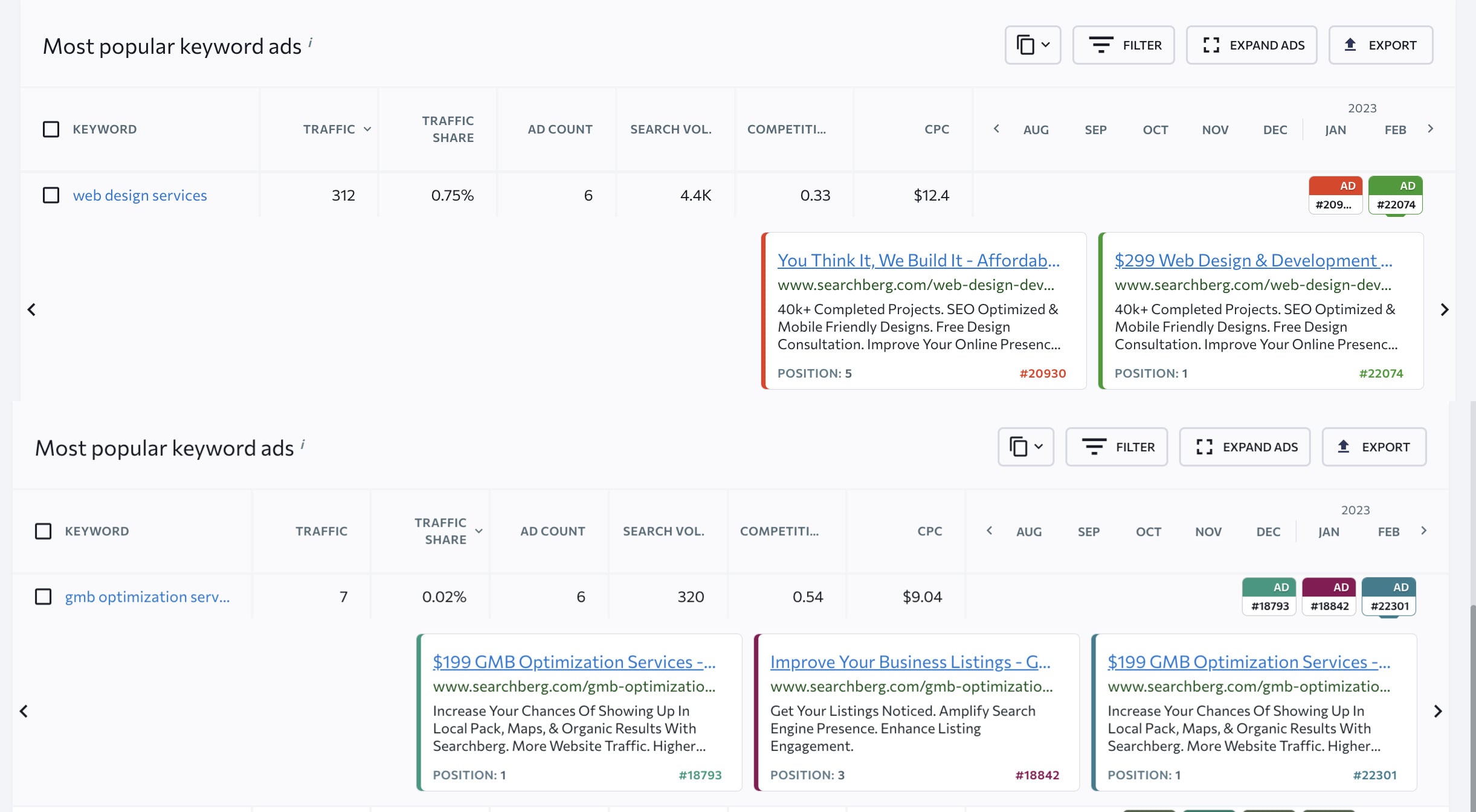
Focused ad campaigns allow SEO agencies to reach their target audience more successfully. By displaying ads to people who are most likely to be interested in specific services your agency provides, you have the opportunity to increase conversion rates. If done properly, it will result in a better ROI for your ad spend and, what’s important, generation of relevant SEO leads.
In addition, SEO agencies can gain more accurate data regarding the effectiveness of their paid advertising campaigns by targeting specific audiences. This is an effective way to evaluate the performance of paid campaigns and make informed decisions to improve their ad strategy.
To stay one step ahead of the competition, keep an eye on your competitors’ paid and organic campaigns. SE Ranking’s Competitive Research tool, for example, allows you to analyze other agencies for the paid keywords they use, the estimated number of clicks their website receives per month, and their estimated monthly PPC campaign budget. On top of that, you’ll get valuable data on their target keywords along with other important SEO metrics, such as keyword difficulty, search volume, competition, and more.
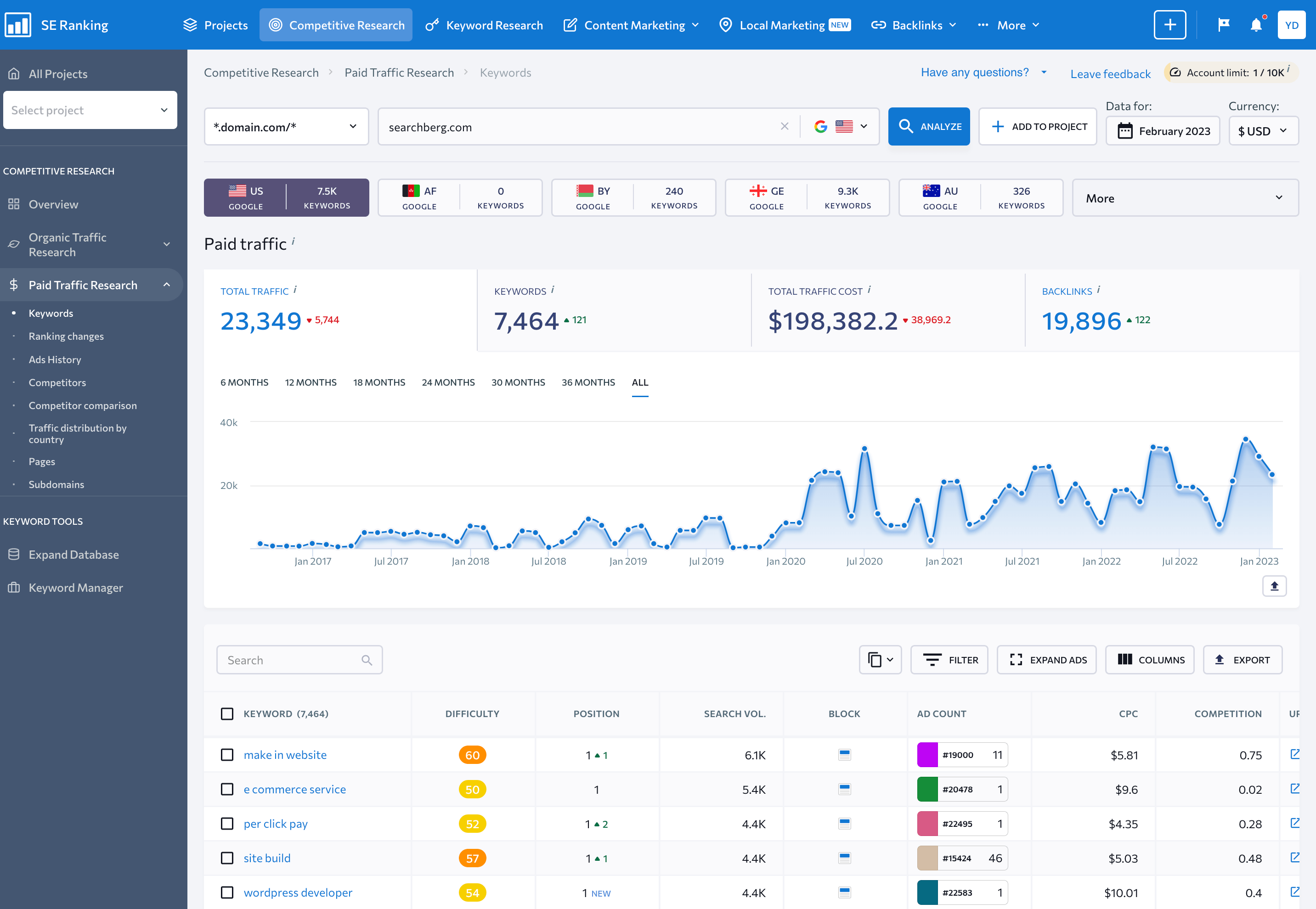
By checking whether competing agencies are using paid ads and the precise messages they are conveying, you can gain valuable insights into the keywords they are targeting, the ad copy they are using, and the landing pages they are directing traffic towards. This information will help you gain a better understanding of their overall digital marketing strategy and competitive position.
This data is also crucial to understand their unique value proposition and how they stand out from other marketing agencies. It could help you figure out what gaps in the market your own marketing services could fill.
By implementing a combination of both broad and narrow Google Ads campaigns, agencies can therefore reach a more qualified audience and increase the likelihood of generating valuable SEO leads.
Step 3. Reach potential SEO leads via social media
SEO-related groups on social networks like LinkedIn and Facebook, and even Slack communities, are excellent platforms for agencies to find and reach potential SEO leads.
For example, by creating a LinkedIn company page and regularly sharing captivating content, SEO agencies can showcase their competitive advantages and improve brand awareness.

LinkedIn is also useful for connecting with prospects and building relationships with other professionals in the same field. Additionally, Linkedin’s targeted advertising options provide opportunities to reach potential clients based on their demographics, interests, or job titles.
Similarly, joining and actively participating in SEO-related Facebook or Slack groups offers agencies the opportunity to collaborate with like-minded professionals, showcase their knowledge and expertise, and potentially generate referrals and SEO leads. These communities not only allow members to share essential industry best practices with one another but they may also refer clients to trusted agencies.

Step 4. Convert traffic into new SEO leads
Having a website built to capture SEO leads after they come to the website is key. Here are some important elements to include in your SEO agency’s website to capture potential clients:
- Clear value proposition: Showcase the agency’s unique value and demonstrate how it can help customers reach their goals.
- Easy navigation: Make sure website users can easily find what they are looking for, including a list of services offered, pricing plans, and contact information.
- Call-to-action elements: Include conspicuous and compelling call-to-action buttons, like “Download Now” or “Contact Us”, to encourage visitors to take a specific action.
- Contact forms: Make it easy for visitors to reach the agency by displaying contact forms prominently on the website.
- Testimonials: Use client testimonials to build trust with leads and establish credibility in the industry.
- Mobile friendliness: Optimize the website for mobile viewing, as mobile devices have become the go-to technology for accessing online content.
- Tracking and analytics: Equip the website with tracking and analytics tools to accurately assess its performance, measuring vital metrics like traffic, leads, and conversions. To find the perfect online assistant for your SEO tasks, check out the article on the best agency SEO software options currently available on the market.
For example, integrating Google Analytics and Google Search Console with SE Ranking is an easy way to get all the necessary analytics data in one spot. This eliminates the need to use multiple tools to collect essential analytics information, as everything can be found in one place, including data on website traffic, user behavior, search queries, and more.
SE Ranking’s Report Builder enables you to craft either automated or manual reports and regularly send them to your clients. The tool lets you select which metrics to display in the report, such as website traffic, search rankings, Google ads data, and more. You can also customize the timeframe for the data to be displayed.
SE Ranking’s White Label feature allows you to remove all SE Ranking logos and replace them with your own, which is particularly advantageous for marketing agencies looking to generate reports that look like they were created internally.
When it comes to getting more SEO clients, you can simplify this process a lot by adding SE Ranking’s SEO Lead Generator to your website. This feature provides visitors with a detailed report on the on-page optimization issues of their web page in exchange for their email address.
By incorporating these elements into their websites, SEO agencies can increase their chances of conversions. However, to maximize lead conversion potential, regular website testing and search engine optimization should be performed.
How to Qualify SEO Leads
To work with each SEO lead effectively, segment them based on different factors, such as business size, country, budget, and the services they are interested in. This will assist your marketing agency in creating proposals targeted at specific groups of customers.
Small vs. big clients
When assessing potential customers, consider the scope of SEO services they require based on their business size. Small businesses may only need local SEO services in order to generate more exposure within their region, while larger ones will unlikely be satisfied with local SEO services only. They typically need a more comprehensive SEO strategy to target a wider audience. Moreover, bigger, more established clients may have more complex organizational structures and decision-making processes, which could result in longer sales cycles.
Clients with very limited vs. huge budgets
When analyzing leads based on their budgets, consider the financial investment required to achieve their desired outcomes. Clients with limited budgets may only be able to afford basic SEO services, while those with greater financial resources may be able to invest in more advanced SEO campaigns. Make sure to assess the potential ROI for each client so that you can tailor your proposals accordingly.

Clients from Europe/America or any other region
For instance, in her book, “The Culture Map,” Erin Meyer explains how cultural differences can change the way clients approach SEO strategies and even their communication preferences. Meyer claims that German customers may prefer a more detailed explanation of any strategy proposed to them, while Americans tend to value direct and concise messaging. Adapting your SEO lead generation strategies to these regional nuances is essential for successful collaboration with clients.
Targeting international or multilingual leads? Learn how to align SEO with user location and language preferences in our localization for SEO guide, packed with examples and practical tips.
Clients who either need SEO only or SEO in combination with other services
SEO agencies often offer a variety of services beyond SEO and PPC advertising, such as web design, content creation, and social media marketing. Thoroughly examining each client’s goals and budget will help you choose which suite of services will be the most beneficial to them. By offering a broad range of services, SEO agencies can provide clients with a tailored approach to digital marketing that meets their unique requirements.

By considering these components and evaluating each SEO lead, marketing agencies can gain deeper insight into their customer’s needs and create custom plans to increase their probability of success.
Communication & Building Relationships with SEO Leads
Communicating clearly and building strong relationships with SEO leads is key to pulling in new customers and strengthening long-term relationships. In this section, we will discuss two key points:
1. Constructing an appealing pricing proposal.
2. Tips for effectively interacting with SEO leads and fostering meaningful connections.
Crafting a winning pricing proposal for your SEO leads requires a personalized approach. Here are some tips to make your proposal more appealing to potential customers:
- Begin with a straightforward introduction. It should highlight the benefits of working with your agency and the services you offer.
- Divide your pricing proposal into sections. By providing in-depth explanations about each SEO service along with its benefits and price, you’ll ensure that your potential customer can make an informed purchase decision.
- Offer customized plans. Don’t just give everyone the same pricing plan – tailor it to your customers’ needs and budgets. This way, you’ll show them that you’re dedicated to helping them succeed and reach their goals.
- Make use of case studies. To show how valuable your services are and how you have helped others in their SEO journey, share examples of case studies featuring clients who have achieved success with your agency.

To build quality relationships with SEO leads, stick to the communication practices listed below:
- Establish clear and timely communication with your SEO leads. Quickly respond to emails and calls to keep them informed.
- Practice openness in communication. If any difficulties arise during the duration of the partnership, make sure to be open and honest with potential customers in order to collaborate on a mutually satisfactory solution.
- Create strong connections with your clients. Get to know them on a deeper level. Show them that you care about their goals, and that you are committed to their success.
- Showcase the success of your work. Keep track of progress with regular reports. Utilize data and metrics to demonstrate the value of your work and how it affects your client’s business.
- Incorporate client feedback. To provide the highest quality of service, make sure to inquire of your clients as to what additional steps can be taken to meet their requirements. By taking a proactive approach, you will be able to provide a more satisfactory experience that will foster trust with each individual client.

According to Adriana Stein, you’ll need to invest more effort in nurturing SEO leads if you’re generating them through outbound methods like LinkedIn ads. This is because these prospects may be unfamiliar with your brand and unaware that they have a problem that needs solving. The approach you take to nurture these leads will depend on your first outbound touchpoint.
In general, Adriana recommends focusing on ensuring that your audience understands their problem, recognizes the need to address it, and sees your brand as the solution. You can achieve this through various means, such as multi-channel ad retargeting, email nurturing, and direct follow-up emails. Regardless of the channel used, it’s important to provide useful information rather than solely trying to sell your services.
Closing Thoughts
For any SEO agency to flourish and thrive, generating leads is an absolute must. Through a mix of tactics, such as SEO, paid channels, and social media promotion, agencies can attract qualified leads and start building relationships with them. Still, not every lead is equal. It’s essential to thoroughly qualify each one and maintain personalized contact to maximize the business’s chances of success.
Anyway, by considering SEO tips from agencies outlined in this step-by-step guide, you significantly increase your chances to attract new prospects and, subsequently, gain more clients.
